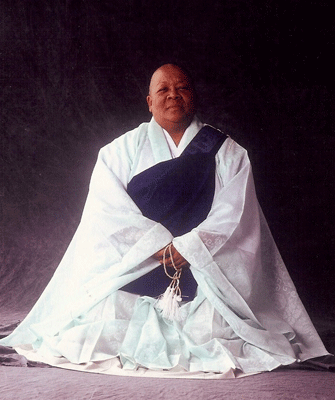
Yesterday’s CNN online opinion section featured a piece by Myokei Caine-Barrett, a Nichiren Buddhist teacher based at the Myoken-ji Temple in Texas. Within the Nichiren Order, Caine-Barrett is the first woman of Japanese and African descent, the only ordained Western woman, and the first female priest in the Nichiren Order of North America. Caine-Barrett came across Buddhism during a quest for a path of faith. As a young child, she hoped that devotion to a religion would help her deal with the isolation she felt as a mixed-raced child living in a world divided by black and white. Since discovering Buddhism at the age of 13, Caine-Barrett says that Buddhist practice has allowed her to better understand reality:
Buddhism has been the mainstay of my life, enabling me to understand life’s reality and providing a practice of faith to deal with that reality. I have learned to release the past and not give in to imagination or the future. Buddhism taught me that there is only now, the present moment. Most people understand the law of cause and effect, or very simply “What goes around, comes around.” When I asked the question “Why is this happening to me?” as I explored various faiths, I never received an answer that made sense. Buddhism taught me that my life is the result of causes made in the past and my future would be the result of causes made in the present.
Caine-Barrett goes on to discuss her work with prisoners—including white supremacists—and the importance of creating sanghas within communities of color:
The practice of Buddhism has much to offer communities of color; however, it may be difficult to find teachers and practitioners with the necessary experience. There is no national directory. We exist in myriad traditions and cities throughout the U.S. Ordination in many traditions is often difficult and expensive, and finding teachers willing and able to address issues relative to being African-American is sometimes impossible. Yet, progress is being made as we create sanghas within communities of color and assume the roles of clergy and lay teachers. It is definitely time for practitioners of color to step up and make ourselves known. Our communities need us to be present now.
Nichiren Shu Buddhism emphasizes the teachings of the Lotus Sutra as the ultimate embodiment of the teachings of the Buddha. Read more about the Lotus Sutra and Japanese Buddhism in Andrew Cooper’s interview with Professor of Japanese Religions Jacqueline Stone and Jeff Wilson’s blog post “An Important New Translation of the Complete Lotus Sutra.” Read more about Myokei Caine-Barrett here on the Nichiren Shu Buddhism site.